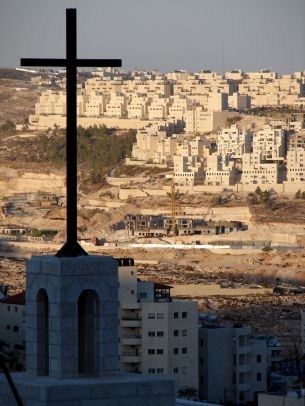The Nativity Explained: Bethlehem

In this part of our series, we examine the place itself, its history, what the Bible tells us of it, and why it is that out of all the villages in all the provinces of all the empires in the entire world, God chose this one to be the birthplace of his one and only son.
Description: The city is approximately 70km east of the Mediterranean sea, 10km south of Jerusalem, and 110km south of Nazareth as the crow flies. Its name literally translates as "house of bread". It existed before the Israelites came to the promised land, and until recently there was relatively little evidence that it was an Israelite city. However in 2012 a clay seal was found with ancient Hebrew on it that read "From the town of Bethlehem to the King", indicating that the city was a destination for tribute and taxes sent to the king.
Significance: The city is the home of the tomb of Rachel, mother of Joseph and Benjamin. It was where Naomi was from and where she took Ruth back to. Most crucially, it was the home of Jesse, the father of David, as well as being the place where David was born and later anointed king, and the site of the well where soldiers bought water from while he was hiding in the cave of Adullam. There is clearly a rich history here, denoting a place of great Biblical importance.
First Sighting: In terms of the Nativity, Bethlehem is cited as Jesus's birthplace on two separate occasions. Once in reference to the Magi, the other while discussing the shepherds.
"After Jesus was born in Bethlehem in Judea, during the time of King Herod, Magi from the east came to Jerusalem"
(Matthew 2, Verse 1)
"…the shepherds said to one another, 'Let's go to Bethlehem and see this thing that has happened, which the Lord has told us about…"
(Luke 2, Verse 15)
Other verses point to the fact that Bethlehem was known to be a place of great importance. We have the prophecies from Micah which explain this.
"But you, Bethlehem Ephrathah,
though you are small among the clans[b] of Judah,
out of you will come for me
one who will be ruler over Israel,
whose origins are from of old,
from ancient times…
He will stand and shepherd his flock
in the strength of the Lord,
in the majesty of the name of the Lord his God.
And they will live securely, for then his greatness
will reach to the ends of the earth."
(Micah 5, Verse 2,4)
And we also have verses from the gospels which tell us that the people of the time were deeply aware of this prophecy.
"When he had called together all the people's chief priests and teachers of the law, he asked them where the Messiah was to be born. 'In Bethlehem in Judea,' they replied, 'for this is what the prophet has written:
'"But you, Bethlehem, in the land of Judah,
are by no means least among the rulers of Judah;
for out of you will come a ruler
who will shepherd my people Israel."
(Matthew 2, Verses 4-6)
Does not Scripture say that the Messiah will come from David's descendants and from Bethlehem, the town where David lived?'
(John 7, Verse 42)
Explanation: The importance of the fulfilment of the prophecies about Bethlehem are crucial, because they confer further upon Jesus the royalty of his lineage, as well as his supernatural qualifications, and his position as the messiah.
Both lineages of his birth provided by Matthew and Luke show Jesus to have been as part of a royal bloodline, through his mother and earthly father. This further connection to David, via his birthplace, piles on the significance of exactly who Jesus is and what he means to the people of Israel.
There is also an important connection to the wider world here. Ruth was not an Israelite, she was a Moabitess, and not only was Bethlehem her adopted home, she was a direct progenitor of David. This was good for David, because it gave him the opportunity to shelter in Moab on one of his many moments on the run, but it also is even greater for us all. Jesus's connection to Ruth, both through bloodline and shared hometown, is an important sign that Jesus is not just a saviour for the Jews, but for all mankind.
Bethlehem was an important choice for a birthplace also because it was lowly and small and supposedly insignificant. Although many great things of historical note happened there, none of them had made the city rich, and it was noted in Micah as such. Jesus coming from there shows us all that he is someone of all the people. He was not separated from anyone, and came from the lowest place to reach all and everyone. The occasion of his birth sees the lowest shepherds and the highest academics come together in solemn and joyous worship. It is apt therefore that he should be born in a town so royal, and yet so humble.











